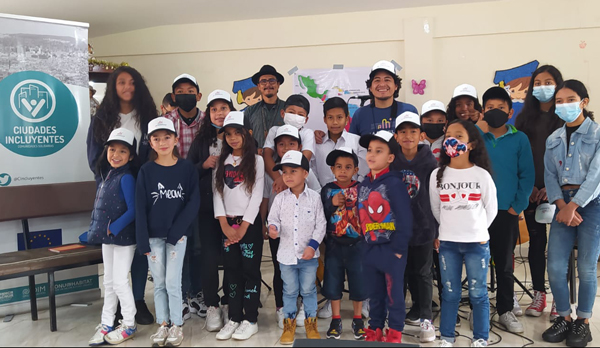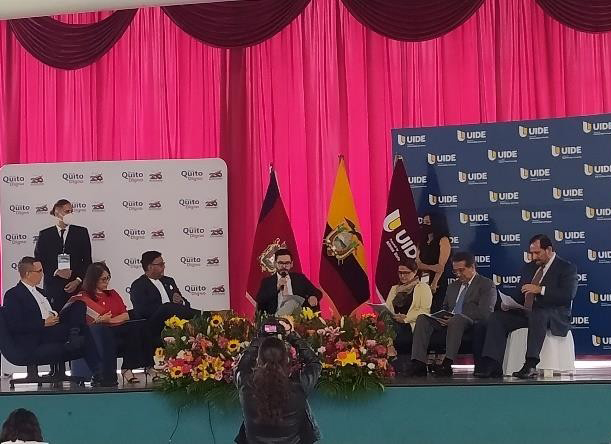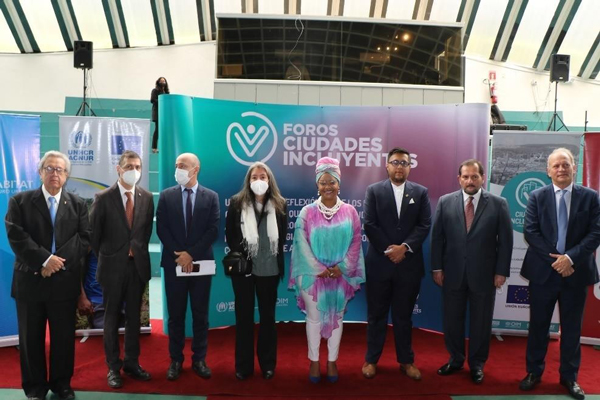
The International Forum of Inclusive Cities “For a more inclusive, supportive and sustainable Quito” took place from May 3 to 5, 2022 at the Marcelo Fernández Auditorium of the International University of Ecuador – UIDE.
The prioritized topics for the development of the forum focused on addressing public space through technical virtual round tables as a factor of social integration; protection and services to address human mobility; the socio-economic inclusion of the population in human mobility; and the sustainability of the territory with issues such as the environment, disability, gender equality, as elements that are part of the dilemmas of inclusive cities.
Similarly, in the face-to-face mode of the third day, a high-level panel was held, moderated by a delegate from the International University of Ecuador and made up of representatives of the national government agencies that act and respond to mobility human, such as the Ministry of Foreign Affairs and Human Mobility; the National Assembly; the National Council for the Equality of Human Mobility; the Ministry of Urban Development and Housing and from the Municipality of the Metropolitan District of Quito, with the participation of the Secretariat of Social Inclusion.
The analysis focused on the institutional opportunities and challenges for the inclusion of people in human mobility in the framework of sustainable development, through the approach of two elements:
Public Policies and Socioeconomic Inclusion (SDG 1, 8, 10 and 11)
Alliances to deal with migration (SDG 17)
The conferences developed as virtual tables received 259 participants in the 4 proposed tables, two were carried out per day, and their themes were raised as follows:

Round Table 1: Public space as a factor of social integration
The objective of this discussion was to address and identify concrete actions that can contribute to meeting the challenges posed for public space interventions, as well as solutions or concrete contributions from each participating sector (private/civil society/academia) to address and extend the development of the proposed initiative to more sectors of the city regarding interventions in public space.
Round Table 2: Human Mobility from the Glocal perspective
The main goal of this discussion was to address and identify concrete actions that can contribute to meeting the challenges posed for the strengthening of services for the population in a situation of human mobility and to identify solutions or concrete contributions from the private sector/civil society/academia to attend and include to the population in a situation of human mobility in the different services provided by each sector.
Round Table 3: Path towards socio-economic inclusion
This discussion headed to address and identify concrete actions that can contribute to meeting the challenges posed for socio-economic inclusion for the population in a situation of human mobility and to identify solutions or concrete contributions from the private sector/civil society/academia for socio-economic inclusion. -Economic of the population in human mobility in the different services provided by each sector.
Round Table 4: Dilemmas to become sustainable and inclusive cities
The objective of this event was to address and identify concrete actions that can contribute to meeting the challenges posed to integrate the population in a situation of human mobility in the sustainable development of the city and identify concrete solutions or contributions from the private sector/civil society/academia to achieve their integration and work on each of the proposed dilemmas (environment, disability, gender equality)

As the main proposals for actions that arise from the four technical virtual tables, its participants and delegates from the various sectors of the academy, the private sector, and civil society, resolved to present the following guidelines for actions to the local authority to make Quito a city more inclusive, supportive and sustainable: